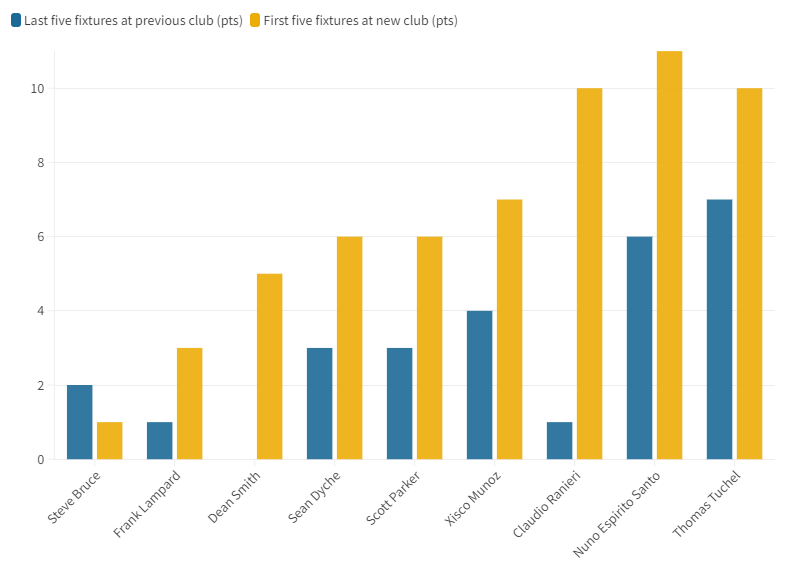Sacked Premier League managers performed better when they first joined their new clubs, data showed.
Top-flight coaches are finding more success after being sacked, with 88.9% of managers in the past two seasons seeing better results following their dismissal.
Over the past two seasons, there have been 22 in-season sackings (and 24 total permanent managerial changes) in the Premier League, which is the most – by far – of any two-year period in Premier League history.
Of those 22, nine (41%) have since taken over new clubs with the hope of rebuilding their coaching reputation.
Those nine are: Xisco Munoz (Watford to Huesca), Steve Bruce (Newcastle United to West Brom), Nuno Espirito Santo (Spurs to Al Ittihad), Dean Smith (Aston Villa to Norwich), Claudio Ranieri (Watford to Cagliari), Sean Dyche (Burnley to Everton), Scott Parker (Bournemouth to Club Crugge), Thomas Tuchel (Chelsea to Bayern Munich), and Frank Lampard (Everton to Chelsea).
The data shown is a comparison of those managers’ last five league games at their old clubs to their first five league games at their new clubs, for a maximum of 15 points each.

Overall, the trend is clear: with an average points differential of +3.5 compared to their old club form, the ‘new manager bounce’ looks to have taken effect across the board.
Here’s a breakdown on some of the notable differences:
Spaniard Xisco Munoz was let go by Watford just a few months into the 2021/22 season after picking up four points in the five fixtures leading up to his departure.
It only took Munoz three weeks to land his new role at second division Spanish side SD Huesca, where he got off to a flying start, picking up seven points and going undefeated in his first five fixtures.
Steve Bruce lasted just over two years at Newcastle United before he was sacked in October 2021, following a winless start to the campaign and a total of 2 points in his last five fixtures at the helm.
And things didn’t get much better for Bruce (pictured below, image courtesy of Getty embed).
He was appointed head coach of West Brom the following February, and only managed one point (in a 0-0 draw against Blackburn Rovers) from his first five games. He’s the only manager of the nine that performed worse at his new side.
Embed from Getty ImagesNuno Espirito Santo impressed at Wolves and earned himself a big move to north London’s Tottenham Hotspur, but was let go after a run of just six points out of a possible 15.
But Santo is now flying high in Saudi Arabia. He went undefeated and picked up an impressive 11 points in his first five matches in charge of Al Ittihad. He won the Saudi Super Cup with the Tigers in his first season and is currently five points clear at the top of the Saudi Pro League in his second campaign.
Aston Villa’s Dean Smith had the worst run of form of any manager in the data set leading up to his departure. He lost all five games, including a home loss that saw them capitulate against Black Country rivals Wolverhampton Wanderers. His side suffered a 1-0 loss to Southampton in his final game.
Smith joined Norwich City just eight days later and became the only manager in Premier League history to manage successive games against the same opponent. This time, however, he beat Southampton 2-1 and picked up a total of five points in his first five matches with the Canaries.
Claudio Ranieri will always be remembered for leading ultimate underdogs Leicester City to a Premier League title in 2016, but his time at Watford was unforgettable for all the wrong reasons. He was let go last January after earning just one point in his final five matches in charge.
Since then, Ranieri has found success at Serie B side Cagliari. He joined the Italian outfit on New Year’s Day, picking up 10 points in his first five fixtures and keeping three clean sheets (the side had only managed four in 21 matches before his arrival).
The results show that managers themselves benefit from managerial changes just as much as their former clubs.



